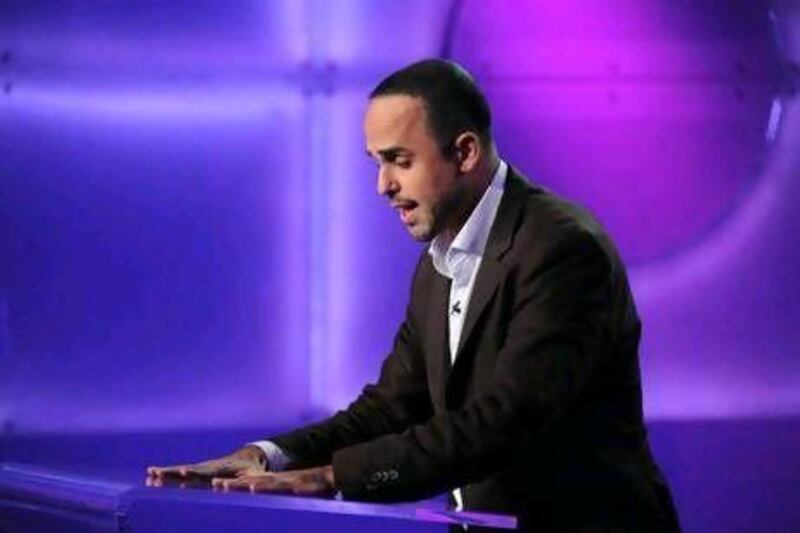DUBAI // It has been a long few months for Mohammed Watfa and the three other contestants who made it to the live finale of Stars of Science tonight.
The programme features the region's top scientific talent competing to see whose innovation is best, with 7,000 contestants whittled down to just four.
Dr Watfa, an IT lecturer at the University of Wollongong Dubai, is one of only two UAE entrants to reach the televised shows stage, which featured the top 20, and the only person from the Emirates in the final.
His virtual computer, designed for use where resources are limited, allows up to 20 people to have their own laptops by projecting a virtual touchscreen on to each person's desk. Different students can use different applications, interacting with the screen using a digital pen.
Dr Watfa, from Lebanon, has spent the last year working on the project.He will face three other entrants from the Arabian Gulf, all competing for the Dh1.1 million prize.
Khaled Eid, from Kuwait, has a 3D holographic screen, while Jaber Henzab, from Qatar, has an automated home pharmacy. Khalid Aboujassoum, also from Qatar, will present an automated home-cooking pot.
Dr Watfa said one of his biggest strengths since the first day of the contest has been his confidence and determination, necessary when facing the tough judging panel, which includes Dr Eyad Masad, a mechanical engineer at Texas A&M University in Qatar, and Dr Farouk El Baz, an Egyptian-American scientist who helped plan Nasa's exploration of the moon.
"I have the best invention that has a purpose," Dr Watfa said. "Also, the fact my invention is one of its kind, has a global purpose and would solve a number of critical problems, including helping provide quality universal education and minimising the environmental impact of using paper in classrooms and the overall power consumed by computers."
In the last month, Dr Watfa has been visiting schools – including Dubai International School and Dubai National School – "to inspire and motivate a future generation of students" to become innovators in a part of the world in which science is not a first choice for a career.
"Our mission as educators and inventors is to become science idols for upcoming generations in the UAE, opening the door for possible exceptional scientific achievements from future UAE students," he said.
Another of the judges, Dr Tarik Yousef, an academic and chief executive of Silatech, a social initiative that works to create jobs and expand economic opportunities for young people across the Arab world, said the show had been vital in promoting science and research.
"What we need in the region is the spirit of innovation, which requires persistence, perseverance and support such as that provided by the Stars of Science programme," he said.
Dr Watfa added: "The support from the UAE has been overwhelming and I am so glad to be resident of a country that supports beautiful minds and innovations like the UAE."
This week, half the votes will be from the judging panel, with the other half coming from the viewing audience.
Dr Watfa said he had learnt personal and professional lessons.
"The most challenging part in the contest is without doubt the fact we had to wear different thinking hats at different stages of the contest," he said.
"At first we were dreamers and innovators of new ideas, then we transformed to engineers, then designers, and finally businessmen working on an efficient business plan for our [projects] to be established companies."
Two weeks ago, viewers saw Naim Yazbeck, the general manager of Microsoft in Qatar, tell Dr Watfa: "I'm pretty impressed with the technology and also impressed with the business thinking behind it.
"So it's not like just a cool technology, but you already thought about some of the business usages.
"Maybe you need to partner with companies like Microsoft, because I can tell you, definitely, we would be interested in looking at something like this, and see how we can take it to the next level."
Despite the positive feedback, Dr Watfa has learnt "not to be over-confident about my invention and overlook small details that might cause the whole system to fail".
"There is a thin line between confidence and over confidence so I try to listen to other people's feedback and don't fall in love with your invention overlooking its drawbacks," he added.
To vote for Dr Watfa, text the number 2 to 5141 (Etisalat) or 9496 (du). The live final is on MBC4 tonight at 9pm.
[ mswan@thenational.ae ]






